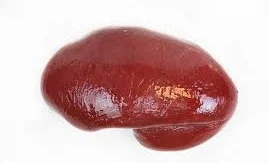SPLEEN
1. Introduction : it is the largest lymph organ and formed by reticular and lymphoid
tissue.
2. Situation : it lies in the left hypochondriac region of the abdominal cavity
between the fundus of the stomach and the diaphragm.
3. Measurments :
1. Colour – purplis
2.Length – 12 cm long
3.Width – 7 cm diameter
4. thickness – 2.5 cm
5. weight - 200gm.
6. shape – slightly oval
1. Colour – purplis
2.Length – 12 cm long
3.Width – 7 cm diameter
4. thickness – 2.5 cm
5. weight - 200gm.
6. shape – slightly oval
4.
ORGANS ASSOCIATED WITH THE SPLEEN
Superiorly and posteriorely –
diaphragm
Inferiorly - left colic flexure of
the large intestine .
Anteriorly -
fundus of the stomach
Medially -
pancreas and the left kidney
Laterally - separated from the 9th ,10th and 11th ribs and the intercostal muscles by the diaphragm .
Laterally - separated from the 9th ,10th and 11th ribs and the intercostal muscles by the diaphragm .
1.
STRUCTURE
: the spleen is slightly oval in shape with the
hilum on the lower medial border .1. The anterior surface is covered with peritoneum
.2. It is enclosed in fibroelastic capsule that dips
into the organ, forming trabeculae. The cellular material consisting of lymphocytes
and macrophages, is called splenic pulp , and it lies
between the trabeculae.3. Red pulp is the part suffused with blood and
white pulp consists of areas of lymphatic tissue where there are sleeves of
lymphocytes and macrophages around blood vessels.
2.
BLOOD SUPPLY
Arterial supply : splenic artery , a branch of the coeliac artery.
Venous drainage : splenic vein , a branch of the portal vein
Blood passing through the spleen flows in sinuses which have distinct pores between the endothelial cells , allowing it to come into close association with splenic pulp.
Arterial supply : splenic artery , a branch of the coeliac artery.
Venous drainage : splenic vein , a branch of the portal vein
Blood passing through the spleen flows in sinuses which have distinct pores between the endothelial cells , allowing it to come into close association with splenic pulp.
3.
NERVE SUPPLY -
symphathetic nerve supply
symphathetic nerve supply
Para
symphathetic nerve supply
8. FUNCTIONS :
a. phagocytosis
a. phagocytosis
b.
storage of blood
c. it
improves immune response
d. it
helps in Erythropoiesis . 






1 Comments
SPLEEN It is one of the important organ
ReplyDelete